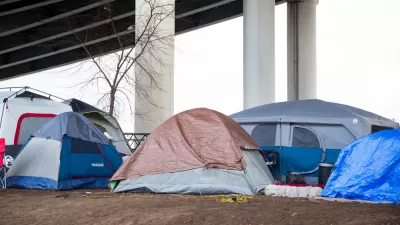Last week the Los Angeles City Council and Santa Clara County Board of Supervisors approved housing initiatives. "Build Better LA" requires large developments to have affordable units. Silicon Valley voters will vote on a $950 million housing bond.
Responding to the housing crisis in California, the council and board voted on the same day, June 21, to ask voters in their respective jurisdictions to address the problem by voting to increase the supply of affordable housing, though in very different ways.
The Los Angeles City Council voted 13-1 to place the "Build Better LA" Affordable Housing and Development Initiative on the November ballot, writes Dennis Romero for LA Weekly. The measure was originally unveiled by a coalition of labor unions and housing advocates last February.
"If approved, the measure would require developers to include affordable housing units in large projects for which they seek special permission to skirt zoning codes or to build beyond density and height restrictions," writes Elijah Chiland for Curbed Los Angeles.
It would also require that 30 percent of construction workers on these projects be hired locally, and that 10 percent be from areas where the median income is under $40,000. Or, developers could avoid the affordable housing rule altogether by electing to pay a fee instead.
A policy summary [PDF] includes additional requirements as they relate to Transit Oriented Communities, Affordable Housing Trust Fund, Parking, and Density Bonus. According to the summary, the initiative "[w]ould ensure that parking requirements can be reduced for projects that include affordable housing and job standards, thus ensuring the integrity of the density bonus program."
The city housing initiative will appear on the ballot with what amounts to a half-cent county transportation sales tax measure.
As posted last March, proponents of a competing housing measure to restrict large developments, the "Neighborhood Integrity Initiative," are aiming for the March 2017 ballot.
About 400 miles north of Los Angeles, the five-member Board of Supervisors of Santa Clara County unanimously voted to place a 30-year, $950 million affordable housing bond before voters in northern California's most populous county.
“For the first time in recent memory, voters see the most important problem facing Santa Clara County as housing,” [Supervisor Cindy Chavez, a cosponsor of the measure said in a press release]. “We have nearly five thousand people living on our streets and in our creeks, and the housing for them does not exist. This is why this bond measure is essential.”
[T]he $950 million General Obligation Bond would not affect the County’s General Fund, but would raise property taxes based on the value of the property for tax purposes. The owner of a home valued at $500,000 by the Tax Assessor’s Office, for example, would pay $12.66 per $100,000 of assessed valuation, or $63.30 a year more in property taxes.
Funds would be allocated to housing meant for various levels of median income levels, including "up to $50 million for Moderate Income residents who are first-time homebuyers."
"The majority of the funds -- $750 million -- would go toward those considered to be in the 'extremely low income' category, often meaning homeless or on the verge of being homeless," writes Eric Kurhi in The Mercury News
The measure will need to pass by a two-thirds margin because the funds are targeted for specific purposes, as was not the case with a June sales tax measure in San José, the county seat, that passed with 61 percent of the vote.
The property tax measure will appear on the county ballot with a half-cent sales tax measure to extend BART under San Jose to the Santa Clara Caltrain Station.
In addition, as posted earlier this month, San Francisco voters will decide on initiatives that deal with increasing heights for affordable housing, legalizing construction of inlaw (accessory dwelling) units, and removal of tent encampments.
FULL STORY: Housing Initiatives to Appear on Northern and Southern California Ballots in November

Alabama: Trump Terminates Settlements for Black Communities Harmed By Raw Sewage
Trump deemed the landmark civil rights agreement “illegal DEI and environmental justice policy.”

Study: Maui’s Plan to Convert Vacation Rentals to Long-Term Housing Could Cause Nearly $1 Billion Economic Loss
The plan would reduce visitor accommodation by 25% resulting in 1,900 jobs lost.

Planetizen Federal Action Tracker
A weekly monitor of how Trump’s orders and actions are impacting planners and planning in America.

Waymo Gets Permission to Map SF’s Market Street
If allowed to operate on the traffic-restricted street, Waymo’s autonomous taxis would have a leg up over ride-hailing competitors — and counter the city’s efforts to grow bike and pedestrian on the thoroughfare.

Parklet Symposium Highlights the Success of Shared Spaces
Parklets got a boost during the Covid-19 pandemic, when the concept was translated to outdoor dining programs that offered restaurants a lifeline during the shutdown.

Federal Homelessness Agency Places Entire Staff on Leave
The U.S. Interagency Council on Homelessness is the only federal agency dedicated to preventing and ending homelessness.
Urban Design for Planners 1: Software Tools
This six-course series explores essential urban design concepts using open source software and equips planners with the tools they need to participate fully in the urban design process.
Planning for Universal Design
Learn the tools for implementing Universal Design in planning regulations.
Caltrans
Smith Gee Studio
Institute for Housing and Urban Development Studies (IHS)
City of Grandview
Harvard GSD Executive Education
Toledo-Lucas County Plan Commissions
Salt Lake City
NYU Wagner Graduate School of Public Service




























